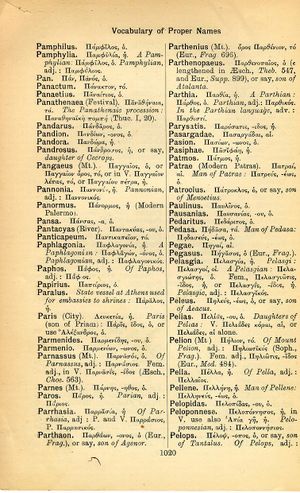Parthaon
Λυποῦντα λύπει, καὶ φιλοῦνθ' ὑπερφίλει → Illata mala repende; amantem magis ama → Den kränke, der dich kränkt, und liebe den, der liebt
English > Greek (Woodhouse)
Παρθάων, -ονος, ὁ (Eur., Frag.), or say, son of Agenor.
Latin > English (Lewis & Short)
Parthāon: ŏnis, m., = Παρθάων,
I son of Agenor and Epicaste, king of Calydon, and father of Œneus: ego te simitu novi cum Parthaone, I know you as well as I do Parthaon, i. e. not at all, Plaut. Men. 5, 1, 45: Parthaone nate, i. e. Œneus, Ov. M. 9, 12; cf. Hyg. Fab. 175; 239 and 242.—Hence,
A Parthāŏnĭdes, ae, m., a descendant of Parthaon: Parthaonides dux, i. e. Tydeus, the grandson of Parthaon; acc. to others, Meleager, the brother of Tydeus, Val. Fl. 3, 705.—
B Parthāŏnĭus, a, um, adj., Parthaonian: Parthaonia domus, the house of Œneus, Stat. Th. 1, 670.
Latin > French (Gaffiot 2016)
Parthāōn, ŏnis, m. (Παρθάων), Parthaon [fils de Mars et père d’Œnée, roi de Calydon en Étolie] : Pl. Men. 745 ; Ov. M. 9, 12 || -ŏnĭdēs, æ, m., fils ou descendant de Parthaon [Méléagre] : Val. Flacc. 3, 705 || -ŏnĭus, a, um, de Parthaon : Ov. M. 8, 441 ; par ext.] d’Étolie : Stat. Th. 1, 670.

